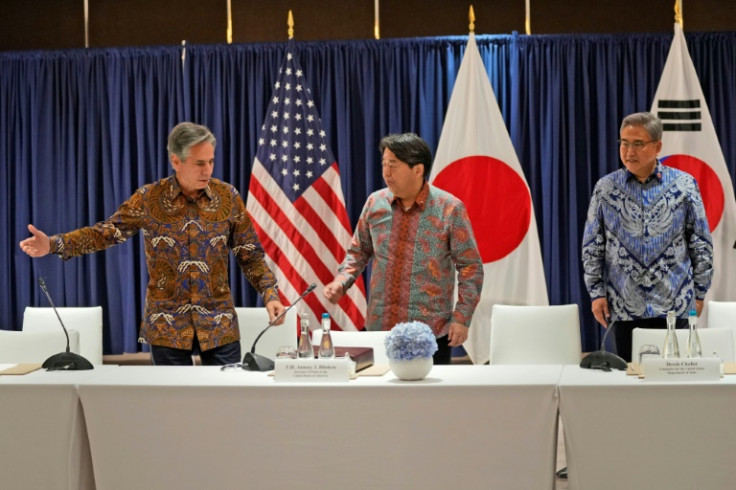Blinken: US, Allies To 'Defend Against Any Aggression' From North Korea

Secretary of State Antony Blinken promised Friday the United States would defend allies from North Korean "aggression", with Japan and South Korea joining a call to punish Pyongyang for its latest intercontinental ballistic missile test.
The top US diplomat met jointly with the South Korean and Japanese foreign ministers on the sidelines of a Southeast Asian meeting in Jakarta, with all three condemning what Blinken called "provocations" from Pyongyang.
"We are joined resolutely in a common defence and making sure that we are doing everything possible to deter and defend against any aggression," Blinken said.
A joint statement released later said that US commitments to defend the two treaty-bound allies "are ironclad and backed by the full range of capabilities, including nuclear".
Washington, Seoul and Tokyo also promised to press for existing UN sanctions against the North -- formally known as the Democratic People's Republic of Korea (DPRK) -- to be "fully implemented".
"Furthermore, the three countries will continue to work closely with the international community to block the DPRK's illicit revenue generation through overseas workers and malicious cyber activities" that fund its weapons programs, the statement said.
China and Russia, however, both hold veto power at the Security Council and in recent months have made clear they do not seek tougher measures against North Korea.
North Korea said leader Kim Jong Un personally oversaw Wednesday's launch of the missile, which the totalitarian state had fired only once before, in April.
South Korean Foreign Minister Park Jin noted that the test came just as regional powers were meeting for the talks in Jakarta, where North Korea sent an official.
"What North Korea is doing is completely against expectations of the international community," Park said.
"I hope that our trilateral dialogue today will strengthen our resolve to respond firmly and resolutely -- unequivocally -- against North Korea's continuous provocations and send the message that their provocations will not go unpunished."
The ICBM flew 1,001 kilometres (622 miles) at a maximum altitude of 6,648 kilometres before splashing into the East Sea, also known as the Sea of Japan, official North Korean media reported.
The launch was a "grand explosion" that shook "the whole planet", the official news agency said.
Kim held historic summits with former US president Donald Trump that eased tensions but produced no lasting agreement.
Diplomacy has been at a standstill under President Joe Biden, who has offered diplomacy but of the more traditional, working-level variety.
"We've consistently said, both publicly and to Pyongyang, we are prepared to engage in dialogue without preconditions," Blinken told reporters at the end of his meetings.
"Unfortunately, to date, Pyongyang's answer to that proposal has been to launch more missiles."
© Copyright AFP 2024. All rights reserved.





















